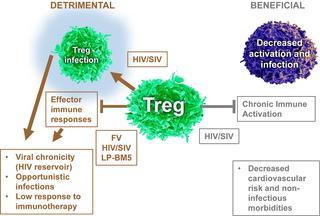PLoS Pathogens ( IF 6.7 ) Pub Date : 2018-02-15 , DOI: 10.1371/journal.ppat.1006776 Kim J Hasenkrug 1 , Claire A Chougnet 2 , Ulf Dittmer 3

|
Tight regulation of immune responses is not only critical for preventing autoimmune diseases but also for preventing immunopathological damage during infections in which overactive immune responses may be more harmful for the host than the pathogen itself. Regulatory T cells (Tregs) play a critical role in this regulation, which was discovered using the Friend retrovirus (FV) mouse model. Subsequent FV studies revealed basic biological information about Tregs, including their suppressive activity on effector cells as well as the molecular mechanisms of virus-induced Treg expansion. Treg suppression not only limits immunopathology but also prevents complete elimination of pathogens contributing to chronic infections. Therefore, Tregs play a complex role in the pathogenesis of persistent retroviral infections. New therapeutic concepts to reactivate effector T-cell responses in chronic viral infections by manipulating Tregs also came from work with the FV model. This knowledge initiated many studies to characterize the role of Tregs in HIV pathogenesis in humans, where a complex picture is emerging. On one hand, Tregs suppress HIV-specific effector T-cell responses and are themselves targets of infection, but on the other hand, Tregs suppress HIV-induced immune hyperactivation and thus slow the infection of conventional CD4+ T cells and limit immunopathology. In this review, the basic findings from the FV mouse model are put into perspective with clinical and basic research from HIV studies. In addition, the few Treg studies performed in the simian immunodeficiency virus (SIV) monkey model will also be discussed. The review provides a comprehensive picture of the diverse role of Tregs in different retroviral infections and possible therapeutic approaches to treat retroviral chronicity and pathogenesis by manipulating Treg responses.
中文翻译:

逆转录病毒感染中的调节性T细胞
严格调节免疫反应不仅对于预防自身免疫性疾病至关重要,而且对于预防感染过程中的免疫病理损害也很重要,在感染过程中,过度活跃的免疫反应对宿主的危害要大于病原体本身。调节性T细胞(Tregs)在这种调节中起着关键作用,这是使用Friend逆转录病毒(FV)小鼠模型发现的。随后的FV研究揭示了有关Treg的基本生物学信息,包括其对效应细胞的抑制活性以及病毒诱导的Treg扩增的分子机制。抑制Treg不仅限制了免疫病理学,而且还阻止了彻底消除导致慢性感染的病原体。因此,Tregs在持续性逆转录病毒感染的发病机理中起着复杂的作用。通过操纵Tregs重新激活慢性病毒感染中效应T细胞反应的新治疗概念也来自FV模型。这项知识引发了许多研究,以表征Treg在人类HIV发病机理中的作用,在此情况下,情况正在复杂化。一方面,Treg抑制HIV特异性效应T细胞反应,并且本身就是感染的目标,但另一方面,Treg抑制HIV诱导的免疫过度活化,从而减缓了常规CD4的感染。+ T细胞并限制免疫病理。在这篇综述中,将FV小鼠模型的基本发现与HIV研究的临床和基础研究相结合。此外,还将讨论在猿猴免疫缺陷病毒(SIV)猴模型中进行的少数Treg研究。综述提供了关于Tregs在不同逆转录病毒感染中的不同作用的全面描述,以及通过操纵Treg应答来治疗逆转录病毒慢性和发病机理的可能的治疗方法。


























 京公网安备 11010802027423号
京公网安备 11010802027423号